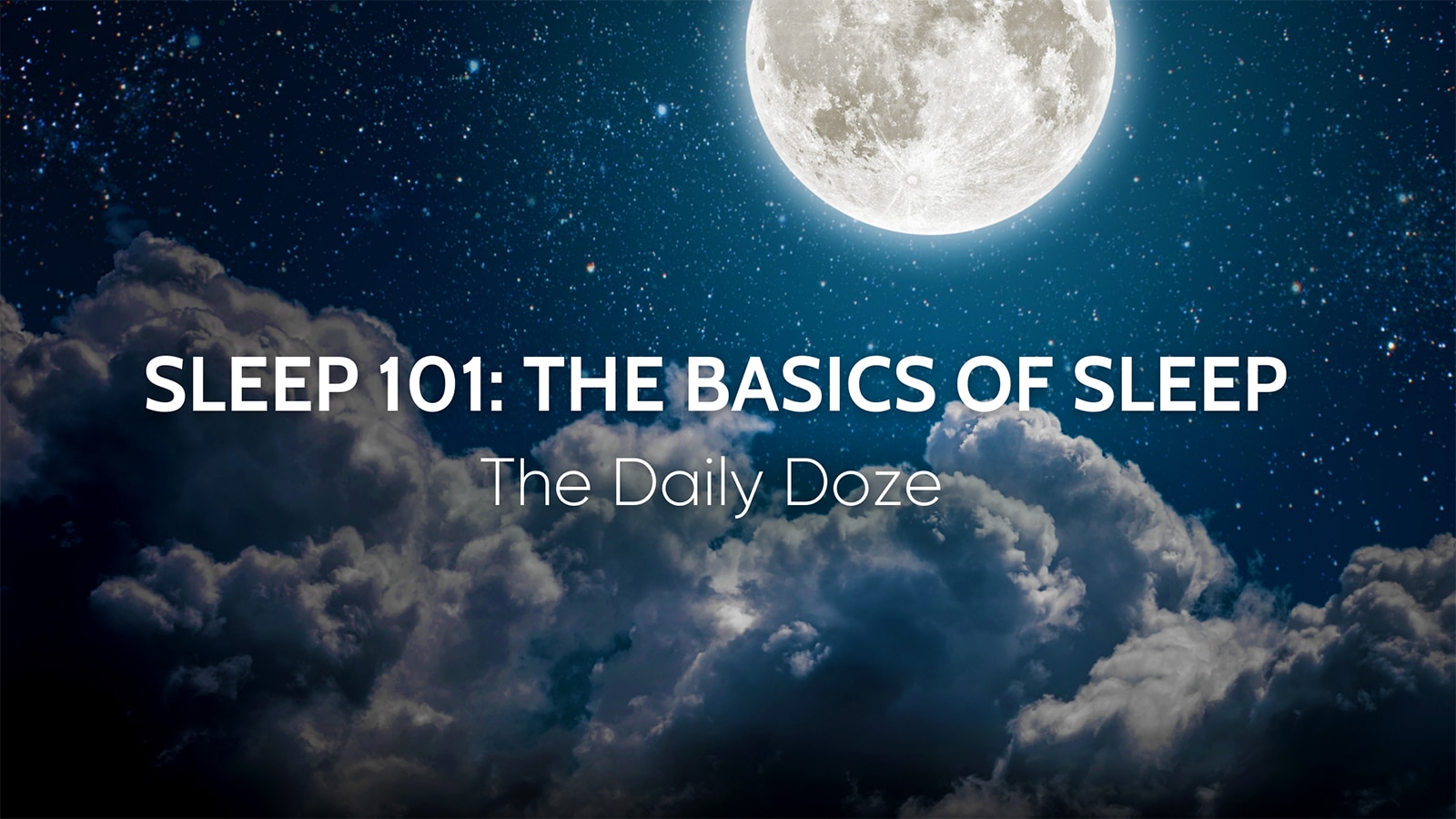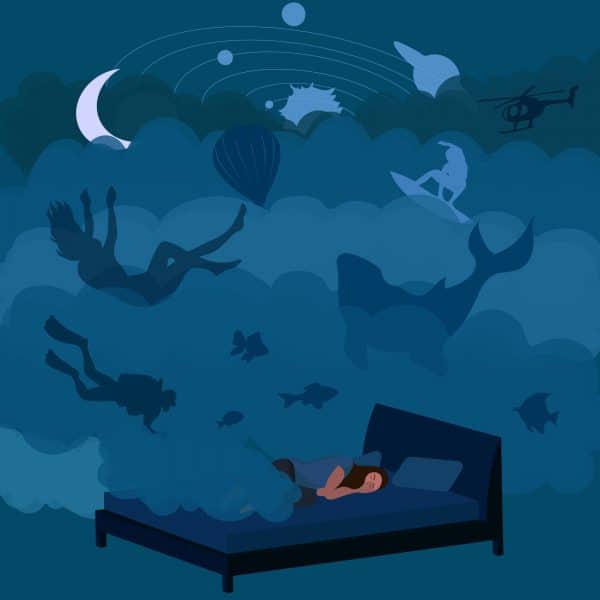
Sleep is often an undervalued aspect of health and well-being.
But anyone suffering from pain, stiffness, fatigue or night sweats who significantly improves their sleep will tell you how much of a difference it really makes!
With recent advances in sleep research and science, the subject has been getting more attention and interest in the press and around the family table. New information has come to light over the past decade that highlights sleep’s importance to good health, as well as the negative impacts if we are deprived of sleep.
Dipping into the world of sleep science will be full of technical and scientific jargon -- so we’re here to break it down for you to be easy to understand. Sleep class is in session!
Here are the basics -- some common terms, concepts and misconceptions about the art and science of slumber.
GLOSSARY: Key Sleep Terms
Circadian Rhythm
The body’s 24-hour internal clock helps in coordinating physical and mental functions, including sleep activity. The Circadian rhythm is the sleep-wake cycle, directly influenced by environmental cues (especially light) and thus deeply tied to the earth’s cycle of day and night.
Fatigue
A feeling of tiredness in terms of mental and physical energy. Problematic fatigue usually overlaps with performance reductions, daytime drowsiness, cognitive impairment and other sleep issues.<
Hypnagogic Hallucinations
Also known as sleep hallucinations, these are sensations that occur when a person is falling asleep that seem very real, but are only the mind. Sleep hallucinations are not quite the same as dreams; a person may think that they have actually seen or felt something, usually in the same room setting they are sleeping in, making it often confusing or frightening.
Insomnia
The chronic condition of sleeplessness. Insomnia is a strict clinical definition where you have difficulty sleeping or staying asleep, even when you have the opportunity to do so.
Lucid Dreaming
A state in which a person is actively aware that they are dreaming. Lucid dreams are often vivid, and the awareness gives the dreamer more control over how the dream unfolds.

Monophasic, Biphasic, and Polyphasic Sleep
These sleep patterns depend on a person’s routine or Circadian rhythm:
Monophasic sleep is considered by modern society as the ‘normal’ sleeping pattern, where people sleep once per day. This sleep pattern was made prevalent during the Industrial Age, with the introduction of electric light and prolonged work hours.
Biphasic sleep typically has two sleep periods, a longer duration at night, plus a shorter period of sleep or a nap during the day. It’s been suggested that this is the healthier sleep pattern and many countries still adopt the biphasic sleep pattern (e.g., Spain and Hispanic countries do their siestas in the afternoon). Before industrialization, historians say it was normal for people to have biphasic sleep.
Polyphasic sleepers have 4 or 6 sleep periods, with frequent naps throughout the day.
REM Cycle or REM Sleep
Our sleep is categorized into these cycles. nREM is composed of the first three sleep stages, transitioning from being awake to falling asleep -- light sleep, deep sleep, and then on to the REM stage.
Otherwise known as ‘Stage R,’ REM is characterized by the ‘Rapid Eye Movement’ for which it is named, plus a faster heart rate and irregular breathing. Vivid dreams occur during this stage, and studies show that REM aids in our memory, learning and problem-solving abilities.
TRUE OR FALSE: Common Sleep Misconceptions
From old wives’ tales to fake news, there is a lot of misleading information surrounding the topic at hand. Such sleep myths, if believed, can lead to insufficient and poor sleep quality despite our best efforts.
Here are the top 4 misconceptions on sleep that need to be debunked:
“You can ‘catch up’ on sleep.”
False. Many people sleep less during the weekdays and try to make it up on weekends. Contrary to popular belief, you can’t quite catch up on lost sleep by sleeping more at another time.
Sleep deprivation has long-term health consequences and loss of sleep is accumulated as a ‘sleep debt’ that compounds as it gets larger -- with health problems, poor performance, stress and loss of focus.
Catching those extra ZZZs over the weekend may reduce daytime drowsiness, but it will not reverse the health effects of sleep deprivation.

“The older you get, the less sleep you need.”
False, though older adults do frequently sleep less than younger people. Aging can affect a person’s circadian rhythm and make it harder for them to sleep as long as they want. Other health problems that coincide with age, such as arthritis or joint pain, may also interfere with a good night’s sleep.
However, the need for sleep does not decrease. It still remains at the recommended 7 to 9 hours daily.
“You can get used to having less sleep.”
False. A few nights of poor sleep will have you feeling markedly drowsy during the day. While energy levels may indeed stabilize if this habit is sustained over weeks or months, it doesn’t mean that your body has conditioned itself to operate with less sleep.
Persistent sleep deprivation affects overall performance and can impair one’s decision-making, creativity, memory and concentration. In the long term, this can adversely affect overall health -- impairing the immune system, cardiovascular health, metabolism, hormone production and mental well-being.
Therefore, it may seem that you’ve grown more accustomed to getting less rest, but it’s not good for your body. You could have serious health problems accumulating, with long-term and irreversible effects.
“It doesn’t matter when you sleep, as long as you sleep enough hours.”
You guessed it -- false. Proper Circadian timing is vital for sleep quality -- it’s best to sleep during hours of darkness or at nighttime as much as possible.
If this is not possible, e.g., you work a graveyard shift, the best you can do is to simulate the day-night cycles in your 24-hour day. Get blackout curtains and allot a timeframe to completely omit any light from your room when you go to sleep.
MAKING THE GRADE: Understand Sleep on a Deeper Level
Learned a thing or two today? Your newfound knowledge on sleep can now be transformed from theory to action.
Quality rest is an investment that will net positive benefits on how you feel and spill over into your work, relationships, health, and the rest of your life.
If you want to understand your sleep even better, our Majestic Beds Team is here for you! Feel free to send us a message to speak with our Sleep Experts. We can help you find the best sleep solution for your needs.
EXTRA CREDIT: Sign Up for Exclusives and Updates
To get the latest information on sleep, click here to get notified about new blog updates!
